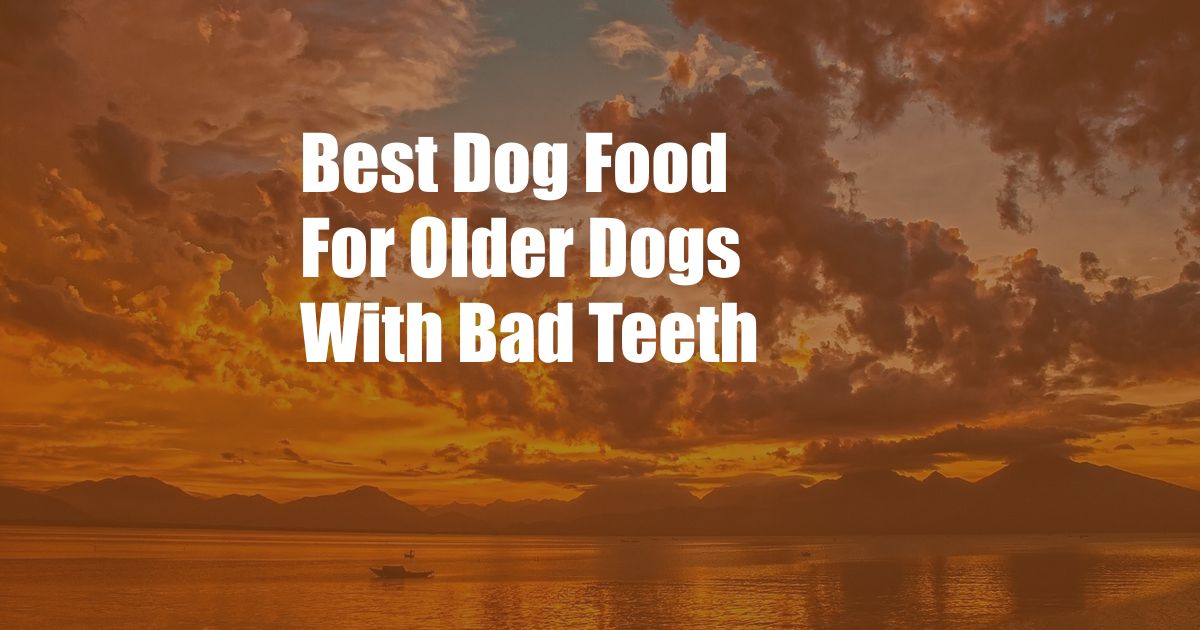
The Ultimate Guide to Choosing the Best Dog Food for Older Dogs with Bad Teeth
As our beloved canine companions age, their dental health often declines, leading to painful and uncomfortable conditions. Bad teeth can make it difficult for senior dogs to eat, which can impact their overall health and well-being. Finding the right dog food for older dogs with bad teeth is crucial, and this comprehensive guide will provide you with the essential information to make an informed decision.
Providing your elderly furry friend with a suitable diet not only eases their discomfort during mealtimes but also supports their overall health. Let’s dive into the specifics of selecting the best dog food for older dogs with dental issues.
Understanding the Needs of Senior Dogs with Bad Teeth
Older dogs with bad teeth experience several challenges that must be addressed through their diet. Gum disease is common, which can lead to inflammation, pain, and tooth loss. Additionally, their chewing ability may be compromised, making it difficult to eat hard or chewy foods.
A suitable dog food for older dogs with bad teeth should meet the following criteria:
- Soft and easy to chew: Small, soft kibble or wet food is ideal, as it puts less pressure on their teeth and gums.
- Highly digestible: Look for foods with high-quality protein sources that are easy on their digestive system.
- Dental support ingredients: Some dog foods contain ingredients that promote dental health, such as green tea extract, cranberries, or coconut oil.
- Low in fat: Senior dogs with dental problems may experience digestive issues, and a low-fat diet can help alleviate these problems.
Choosing the Right Dog Food
When selecting dog food for older dogs with bad teeth, consider the following types:
- Senior Dog Food: Specifically formulated for the nutritional needs of aging dogs, senior dog food is often softer and easier to chew.
- Dental Dog Food: These foods contain ingredients that help clean teeth, reduce plaque, and freshen breath.
- Wet Dog Food: Wet food is soft and moist, making it easy for dogs with dental problems to eat.
- Homemade Dog Food: If you are comfortable cooking for your dog, you can prepare soft, homemade meals using ground meat, rice, and vegetables.
Expert Tips and Advice
Beyond choosing the right dog food, there are additional tips to enhance the dental health of older dogs:
- Regular Dental Check-ups: Schedule regular appointments with your veterinarian to check your dog’s teeth and address any issues early on.
- Dental Cleaning: If necessary, your veterinarian may recommend a dental cleaning to remove tartar and plaque buildup.
- Dental Chews: Dental chews can help remove plaque and tartar, freshen breath, and stimulate saliva production.
- Avoid Hard Treats: Hard treats can damage teeth and worsen dental problems.
FAQs on Dog Food for Older Dogs with Bad Teeth
Here are some common questions and answers regarding dog food for older dogs with bad teeth:
- Q: What are the signs of bad teeth in older dogs?
A: Signs include difficulty eating, drooling, bad breath, bleeding gums, and loose or broken teeth. - Q: Can I give my dog human food if they have bad teeth?
A: Generally, no. Human foods are not formulated for dogs and may be difficult for them to chew. - Q: How often should I brush my dog’s teeth?
A: Aim to brush your dog’s teeth at least twice a week using a dog-specific toothpaste. - Q: Is it okay to feed my senior dog raw food?
A: Raw food diets can be beneficial for some dogs but should be discussed with your veterinarian first to ensure it is appropriate for your dog’s health.
Conclusion
Providing your beloved senior dog with the right diet can significantly improve their comfort and well-being while addressing their dental challenges. By following the guidelines and expert advice outlined in this comprehensive guide, you can make informed decisions and choose the best dog food for older dogs with bad teeth. Remember, maintaining proper dental health is essential for their overall health, and your love and care can make all the difference.
Are you interested in learning more about the topic? If so, what specific aspects would you like to know about?